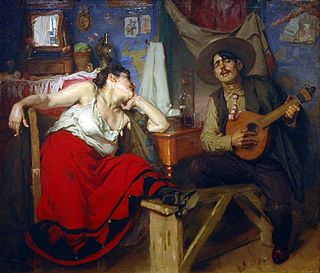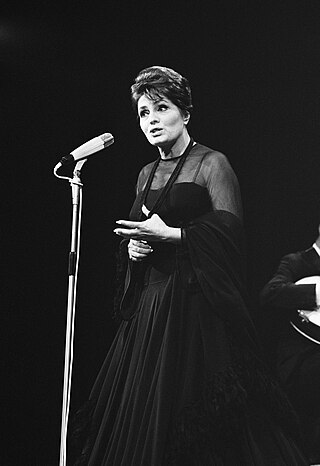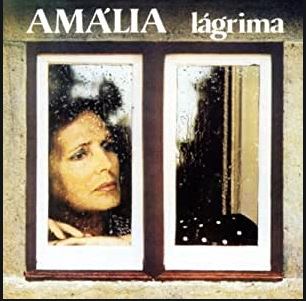
Ramana Vieira is a contemporary American singer of the traditional Portuguese Fado . [1]

Ramana Vieira is a contemporary American singer of the traditional Portuguese Fado . [1]
Vieira was born just east of San Francisco, California in San Leandro. Her parents had immigrated to the United States from Portugal, where her grandfather was a well-known musician and composer from Madeira. She grew up listening to American pop music and Broadway musicals, along with the traditional Portuguese music from her parents' homeland. She attended local San Leandro schools, then studied the performing arts at the American Conservatory Theater (ACT) in San Francisco. Vieira said that as a young singer she had no interest in performing fado until she visited Portugal when she was 16 years old. [1] In Portugal, Vieira connected with her roots and found that fado ignited her passion. She began to study intensively with local fado musicians and had the opportunity to perform.
Vieira recorded her debut album, Sem Ti (Without You) in 2000. In 2004, she self-released a CD titled Despi a Alma (I Undressed My Soul). The album included the song Para Amar which was included in a video montage for the 2006 Winter Olympics. Vieira was among the performers who sang at the 2008 MusiCares Person of the Year ceremony. In 2009, she released the album Lagrimas De Rainha (Tears of a Queen), which (according to Vieira's press releases), reached number 43[ citation needed ] on the World Music Radio [ clarification needed ] charts. In 2015, Vieira released (Fado da Vida), of which several tracks have been nominated at the International Portuguese Music Awards (IPMA). In 2015 she had two nominations: Nem As Paredes Confesso was nominated for Best Fado Performance; and Cabo Verde, which Vieira composed herself was nominated for Best World Music Performance. In 2016, the International Portuguese Music Awards nominated Ai Mouraria for Best Fado Performance.

Edna María Nazario Figueroa is a Puerto Rican pop singer who has achieved stardom both at home and abroad. She has been in the music business from a young age and has released twenty-three studio albums, five live albums and two extended plays (EPs) throughout her career.

Fado is a music genre which can be traced to the 1820s in Lisbon, Portugal, but probably has much earlier origins. Fado historian and scholar Rui Vieira Nery states that "the only reliable information on the history of fado was orally transmitted and goes back to the 1820s and 1830s at best. But even that information was frequently modified within the generational transmission process that made it reach us today."

Marisa dos Reis Nunes, known professionally as Mariza, is a Portuguese fado singer.

Amália da Piedade Rebordão Rodrigues, known as simply Amália Rodrigues or popularly as Amália, was a Portuguese fado singer (fadista).

Dulce José Silva Pontes is a Portuguese songwriter and singer who performs in many musical styles, including pop, folk, and classical music. She is usually defined as a world music artist. Her songs contributed to the 1990s revival of Portuguese urban folk music called fado.
Susana Maria Alfonso de Aguiar, known mononymously as Mísia, was a Portuguese fado singer. She was a polyglot, singing some of her songs in Spanish, French, Catalan, English, and Japanese.

Vitorino Salomé Vieira, commonly known simply as Vitorino, is a Portuguese singer-songwriter. His music combines the traditional music of his native region of Alentejo and urban popular song.

António Manuel Mateus Antunes, known professionally as Tony Carreira, is a Portuguese singer and musician. Born in the small rural locality of Armadouro, Pampilhosa da Serra, he moved to Paris at age 10 with his emigrant parents. He lived there for 20 years. Carreira has had several hits since 1991, becoming during the 2000s one of the most renowned and best-selling popular singers in his home country. Tony Carreira has performed sold out concerts in one of the largest venues in Portugal, the Pavilhão Atlântico in Lisbon, and also at the Olympia in Paris. His successful career largely overshadowed and was not affected at all by the fact that in the late 2010s he was involved in the most controversial plagiarism case in the Portuguese music scene ever.

Ana Cláudia Moura Pereira, known as Ana Moura, is a Portuguese fado singer. An internationally recognized singer, she was the youngest fadista to be nominated for a Dutch Edison Award.

Katia Guerreiro is a South African-born Portuguese fado singer, who has released eight albums and has received several awards, including Order of Arts and Letters, Chevalier rank, from the French government and the Order of Prince Henry from the President of Portugal.

Paulo de Carvalho is a Portuguese singer.

Lágrimas Cálidas is the debut studio album by Colombian recording artist Fanny Lu, released on August 8, 2006. The record contains ten tracks, most of which were composed by Jose Gaviria, and produced with Andres Munera. Musically, the album experiments with tropipop, which is composed of the genres of vallenato, merengue, and pop music. Recording for the album took place in 2004 in three cities: Miami, Bogota and Medellin. An international version of the album, containing two remixes, was released exclusively in United States, Spain and Colombia.

Alma is the second album released by Portuguese fado singer Carminho. It was released on 2 March 2012. The album features three classical fados, from the repertoires of Amália Rodrigues, Maria Amélia Proença and Fernanda Maria, three originals, including Bom Dia, Amor, from a letter by Fernando Pessoa, and two versions of traditional fados, with new lyrics, including Folha, written by Carminho herself. The album includes two versions of songs of great names of the Brazilian Popular Music, Meu Namorado, by Chico Buarque, and Saudades do Brasil em Portugal, by Vinicius de Moraes.

Alice Caymmi is a Brazilian singer and songwriter. She is the granddaughter of Dorival Caymmi, daughter of Danilo and Simone Caymmi and niece of Nana and Dori Caymmi.

Maja Milinković is a Bosnian fado singer and songwriter, born in Sarajevo, the capital of SR Bosnia and Herzegovina.

Lágrima is a fado album recorded by Amália Rodrigues and released in 1983 on the Columbia label (1652541). It was her final studio recording of new songs.

Amália Por Cuca Roseta is an album released by fado singer Cuca Roseta. It was released in 2020 by Sony Music. The album is Roseta's tribute to Amália Rodrigues, an album on which she interprets the classic fado songs of Amália. Roseta is accompanied on the album by Portuguese guitar, fado viola, and bass viola. "Barco Negro" and two other songs also include percussion. Reviewer Leonor Alhinho wrote: Calm, intimate and of an excellent vocal quality, this album is a must for anyone who enjoys fado."

Mariza is the sixth studio album by fado singer Mariza. It was released in 2015 by Warner Music Portugal. The album peaked at No. 1 on the Associação Fonográfica Portuguesa chart and was certified as a double platinum album. It also reached No. 13 on US World chart. The album received a Latin Grammy nomination for Best Portuguese Language Contemporary Pop Album in 2016.

Mariza canta Amália is the eighth studio album by fado singer Mariza. It was released in 2020 by Warner Music Portugal. The album peaked at No. 1 on the Associação Fonográfica Portuguesa chart.
Luísa Basto is a Portuguese singer, best known for her recordings of the anthem of the Portuguese Communist Party (PCP), Avante Camarada, and of É Para Ti Mulher Esta Canção, anthem of the Portuguese Movimento Democrático de Mulheres